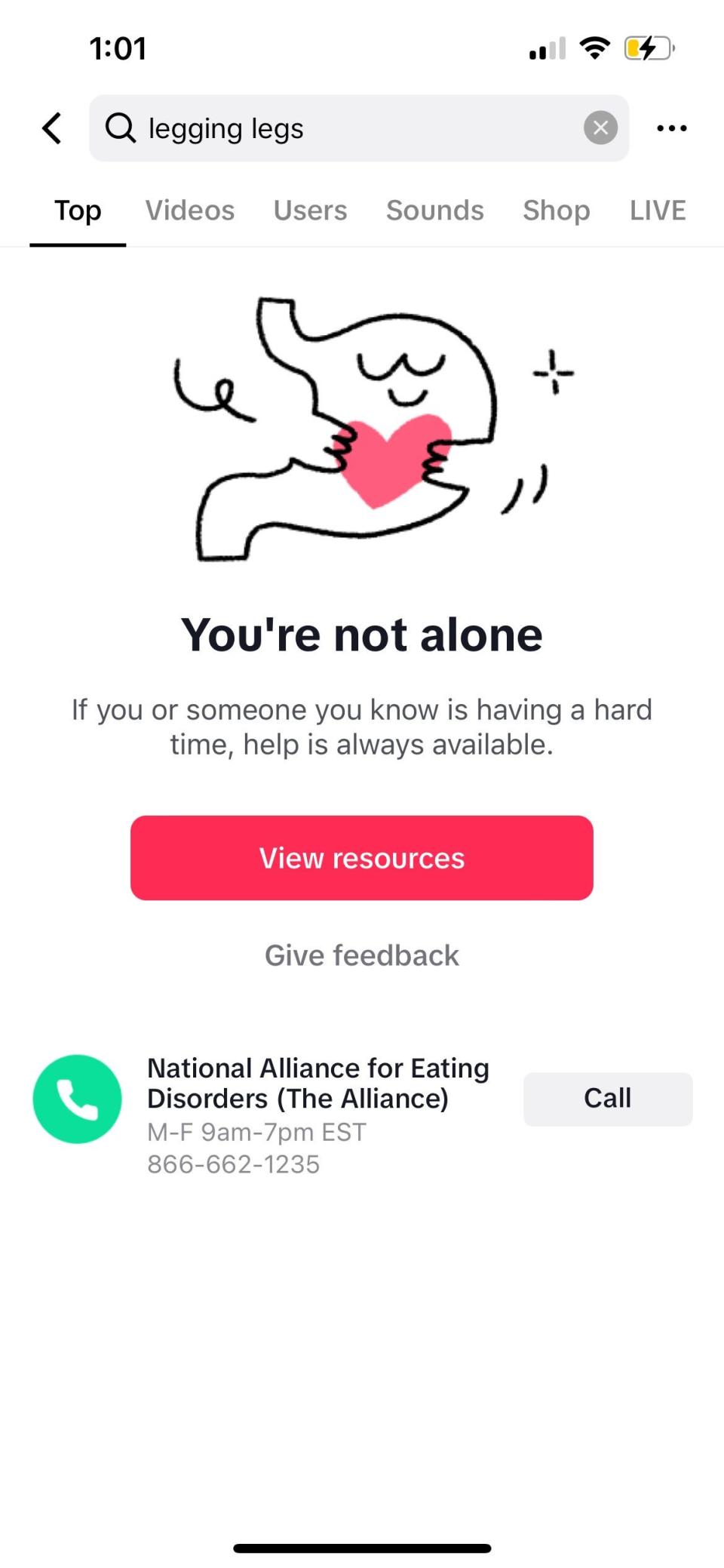TikTok blocks 'legging legs' searches amid backlash, offers eating disorder resources instead
Latte makeup. Glazed donut nails. Glass skin.
As far as beauty trends go, the majority of them are in general harmless. Many of them simply offer a new way to style hair or clothing, or offer different methods to makeup or skincare application. Other trends are often older ones recycled, for example "clean girl makeup" which was truly just the "no-makeup makeup" trend under a different name. Other trends however, can inflict harm on its targeted audience.
One "trend" from the mid 2010s which has made a comeback is the thigh gap, now referred to as "legging legs" on TikTok.
Back in the mid 2010s, many young women aspired to have thigh gaps due to popular posts on Tumblr. Now, TikTok users are expressing that having a thigh gap is ideal for wearing leggings.
Searching for "legging legs" on TikTok however won't populate any results anymore. Instead users of the video sharing platform are being directed to content providing eating disorder resources and are encouraged to call the National Alliance for Eating Disorders. The platform provides a brief explainer of eating disorders and offers tips on how to handle body image issues and concerns.
Despite TikTok's attempts at limiting exposure, the harmful content is still visible. Users are still able to access some of the videos by searching legging legs slightly misspelled.
'If you have a body and you have leggings, you have legging legs': How users are responding to the trend
Many users, mainly women, have united against the trend online.

One TikTok user, bellafernn, denounced the trend and stressed the importance of the type of message body shaming tactics such as "legging legs" can instill in younger generations.
"Guess what? My thighs have touched my entire life, I have never had a gap in between my thighs, ever in my life," she said. Bellafernn continued by encouraging others to not fall victims to negative trends aimed at causing insecurities.
"I love myself for who I am, and I'm not going to let a stupid effing trend define how I view myself." she said.
Holly Essler, a clinical therapist, called the trend disgusting in a TikTok post.
"Do not let social media tell your body that it is a trend," she said. "If you have a body and you have leggings, you have legging legs. Wear the leggings, be proud, be confident, you have legging legs."
Another TikTok user, mikkzazon, called the trend the most "eurocentric, b*******" beauty standard she's ever heard of. She said the reason why some women have thigh gaps is due to their genetics.
According to Women's Health magazine, thigh gaps are caused by variety of factors - body composition, body fat percentage and bone structure.
"Now we have young girls out there who think that they were born wrong," said mikkzazon. "These trends have got to stop. Social media is so freaking harmful and toxic."
Lawmakers and child advocates say social media has failed to protect children from online dangers for years

TikTok's attempts to limit exposure to certain content and offering resources comes in the midst of multiple social media giants receiving criticisms from lawmakers and parents, saying that the platforms are not doing enough to protect users, specifically children.
During a Congressional hearing on Wednesday, Meta CEO Mark Zuckerberg apologized to families who have accused Facebook and Instagram of harming their children.
“I’m sorry for everything you have all been through,” Zuckerberg said. “No one should go through the things that your families have suffered, and this is why we invest so much and we are going to continue doing industry-leading efforts to make sure no one has to go through the things your families have had to suffer.”
Tennessee is among the states which have sued Meta, accusing the social media company of of violating consumer protection laws and deceptively marketing their platforms to adolescents to the detriment of their mental health. The Clarksville-Montgomery School District has also sued TikTok and Instagram over mental health issues that have stemmed from social media.
Throughout the hearing, Congress chastised the leaders of some of the nation's top social media companies (X, Snap, Instagram, and Facebook) and called on them to take immediate steps to protect children and teens online.
Lawmakers however have also been a part of the problem, they acknowledged. In recent years, the only federal internet law Congress has passed has been the Stop Enabling Sex Traffickers Act or SESTA, which was approved in 2018.
Diana Leyva covers trending news and service for The Tennessean. Contact her at Dleyva@gannett.com or follow her on X, the platform formerly known as Twitter at @_leyvadiana
This article originally appeared on Nashville Tennessean: TikTok 'legging legs' search blocked amid body shaming trend backlash

